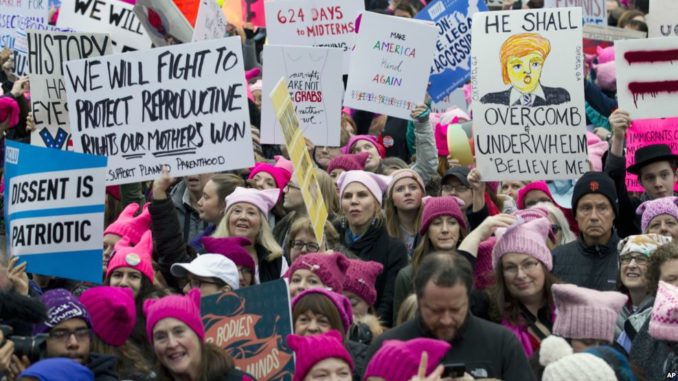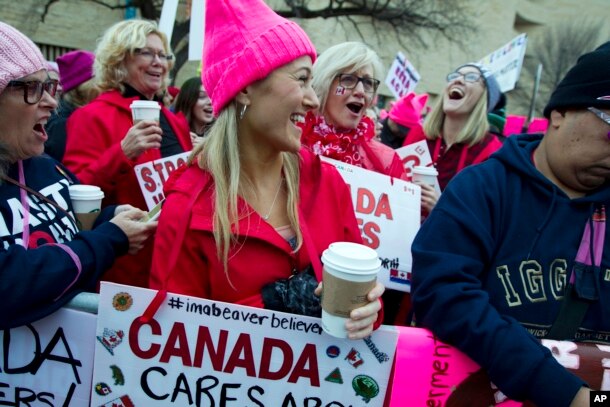
WASHINGTON — Marchers are streaming into the U.S. capital city for the Women’s March on Washington. Wearing pink hats and carrying signs, they are gathering in front of a stage spanning Independence Avenue.
A rally is set to begin at 10 a.m. local time featuring celebrities such as singers Katy Perry and Cher, “Walking Dead” TV star Danai Gurira, Indian actress Padma Lakshmi, Latina actress America Ferrera, film star Scarlett Johnansson and feminist icon Gloria Steinem. Following the rally, protesters plan to march to the White House.
The demonstration comes a day after President Donald Trump’s inauguration, which drew hundreds of thousands of people to Washington.

Women with bright pink hats and signs begin to gather early and are set to make their voices heard on the first full day of Donald Trump’s presidency, Jan. 21, 2017 in Washington.
Organizers for the Women’s March on Washington say they are also expecting a few hundred thousand people to protest the new president’s policies and advocate for women’s rights.
Washington officials said 1,800 buses have registered to park in the city Saturday, which could mean nearly 100,000 people coming in just by bus.
Women’s rights
Organizers of the march on Washington say they want to send a message to Trump on his first full day in office that women’s rights are human rights. Demonstrators say they are calling for racial and gender equality, affordable health care and abortion rights – issues they say are under threat in a Trump presidency.
Three generations of the Megee family traveled from Alabama, Texas, and California for a reunion at the #WomensMarchpic.twitter.com/qPa4KKZJYN
— Esha Kaur Sarai (@egkaur) January 21, 2017
Sarah Young, who traveled from her home in Indiana to march in Washington, told VOA her key concern is women’s health care.
“Access to birth control and access to women’s health care has done more for women’s empowerment in the 20th Century and moving into the 21st Century than anything else. If we want to keep those gains, we need to keep access to health care,” Young said.
Angela Rose from Arizona in DC for the #WomensMarch: I’m here to set an example that you have to stand up and speak up for what you believe pic.twitter.com/xwbOi4mAkj
— Esha Kaur Sarai (@egkaur) January 21, 2017
Other issues motivating the participants are ending violence against women, environmental justice, and protecting the rights of workers, people with disabilities, immigrants and the LGBTQ community.
Protesting from home
Organizers say 673 similar marches are planned around the U.S. and worldwide in such major cities as New York, San Francisco, London, Berlin, Nairobi and Sydney.
Lou Ann Homan of Indiana told VOA she will make her voice heard closer to home.
“There are pockets of marches all over the country, in every town and every big city, and for us, we will be going, a large group of us, to Fort Wayne (Indiana) to show solidarity, to show that we care,” she said.
Demonstrators take part in the Women’s March on London, following the Inauguration of U.S. President Donald Trump, in London, Jan. 21, 2016.
The idea for the women’s march began on Facebook when several women around the country, upset about the presidential election results, started Facebook pages, and called for action.
Within days, some of those pages had more than 10,000 people who had joined. Many of those people voiced concerns, among other things, about comments Trump has made about women.
The women’s march has also drawn its own controversy with people taking to social media to criticize the movement.
On Thursday, the hashtag #RenameMillionWomenMarch trended on Twitter in the United States with people suggesting new names for the protest.
Some suggestions mocked the protesters for not being able to accept the results of the election. Others criticized the movement for not being inclusive, including women who oppose abortion who said they do not feel welcome to join.
